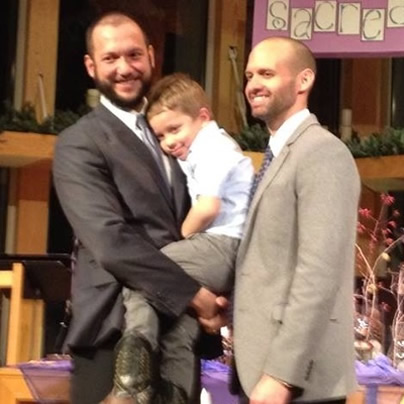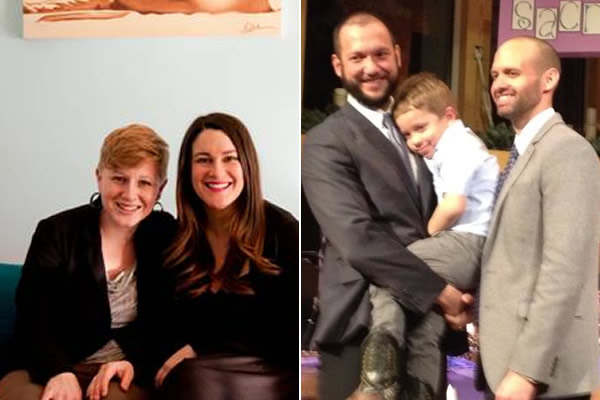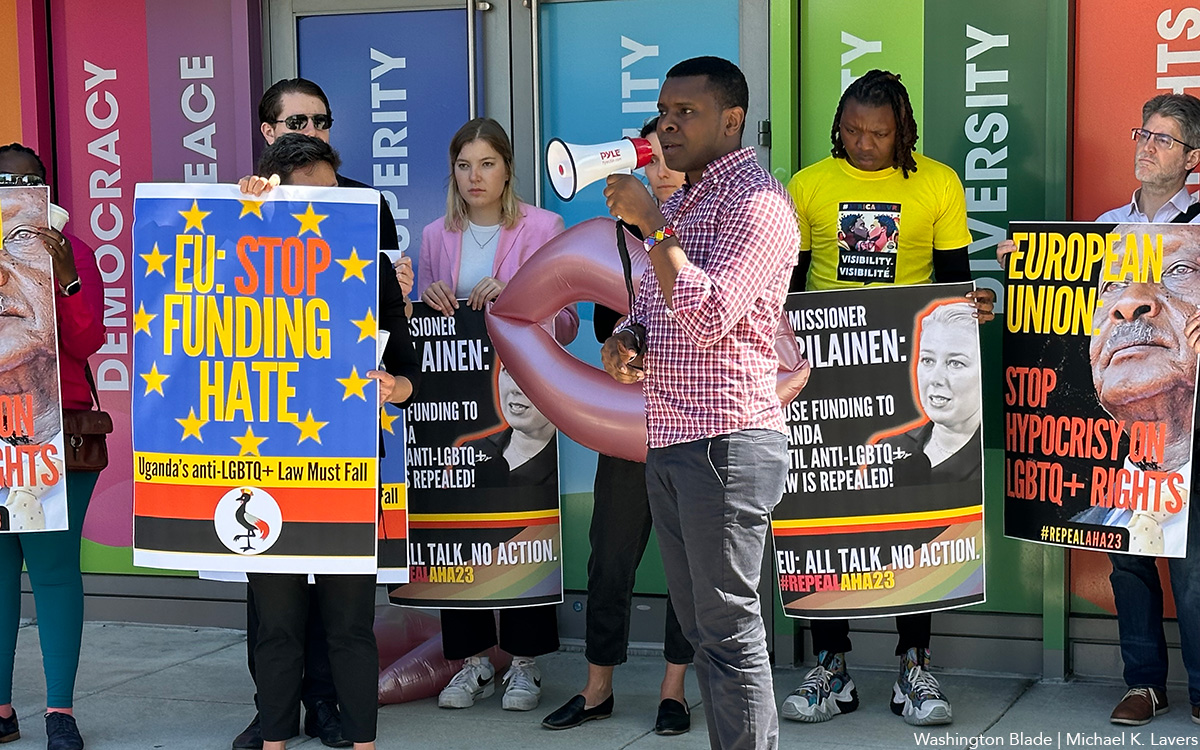News
Gay couples sue Utah to recognize their marriages
ACLU files lawsuit on behalf of four couples who wed


Elenor Heyborne (on left) and Marina Gomberg; Matt Barazza, Tony Milner (left) and Jesse (center) are suing Utah to recognize their marriages. (Photos courtesy of the American Civil Liberties Union)
For Matt Barazza, government recognition of his marriage in Utah is important not only to him and his spouse, Tony Milner, but also to the four-year-old child whom they’ve raised since his birth.
After marrying in their home state of Utah on Dec. 20 — the first day same-sex marriage came to Utah — the couple submitted paperwork for a second-parent adoption of the child, Jesse, and received a hearing date of Jan. 10. But plans changed after Gov. Gary Herbert announced the state wouldn’t recognize Utah same-sex marriages in the wake of a stay on the weddings from the U.S. Supreme Court.
As a consequence, the judge presiding over the request for second-parent adoption pushed back the hearing to Jan. 31, and Barazza and Milner elected to join a proposed lawsuit by the American Civil Liberties Union to ensure Utah would recognize the more than 1,300 gay weddings performed in the state.
“That’s the primary reason for us filing the lawsuit at this point was to have the Utah courts make a decision and recognize that our marriage is legal, so that we can go forward with the second-parent adoption and try and get the protections that we can for our son,” Barazza told the Washington Blade on Monday.
While Barazza, 38, an attorney, and Milner, 33, a director of a non-profit that serves homeless families, are both raising Jesse in Salt Lake City, only Barazza is recognized as the adoptive parent because under Utah law, only one of the two was able to adopt the child. The couple also legally married in D.C. in 2010, but elected to do so again when same-sex marriage came to Utah so they could wed in their home state.
But with their marriage no longer recognized by Utah, Barazza said he lives in constant fear of what might happen because of the lack of legal recognition between his partner and their son.
“You fear the worst case scenario always,” Barazza said. “As the one who’s the legal parent, if anything were to happen to me, it would leave [Jesse] basically an orphan as far as the law is concerned…All that would be in spite of my husband Tony being there from Day One and being just as much a parent as I am.”
On Dec. 20, U.S. District Judge Robert Shelby ruled that Amendment 3, Utah’s ban on same-sex marriage, was unconstitutional as a result of a federal lawsuit seeking marriage equality, allowing gay couples to wed in the state immediately. But upon the request from the state, the U.S. Supreme Court placed a stay on the weddings on Jan. 9 pending appeal of the lawsuit. The next day, Herbert said the state wouldn’t recognize the same-sex marriages of couples that married in Utah before the stay was in place.
Although U.S. Attorney General Eric Holder would later announce the marriages would be recognized for federal purposes, as it stands now the couples will have to wait for the outcome of the federal lawsuit — which could take years — to find out whether the state will recognize their marriage.
Barazza and Milner are one of four couples seeking recognition of their marriage from Utah after having wed in the 18 days when same-sex marriages were legal there. The lawsuit was filed Tuesday in state court by the American Civil Liberties Union, the ACLU of Utah and the Salt Lake City-based firm Strindberg & Scholnick, LLC.
The 32-page complaint alleges Herbert’s decision not to recognize the marriages violates both the due process clause under Utah’s constitution and the Fourteenth Amendment to the U.S. Constitution. Additionally, it seeks relief under declaratory judgment and Rule 65B, which allows individuals in Utah to seek extraordinary relief against wrongful use of public authority.
“By placing recognition of their marriages ‘on hold,’ the State of Utah has placed the legal status of plaintiffs’ families, including their children, in legal limbo and created uncertainty as to their rights and status in virtually all areas of their lives,” the complaint states.
Joshua Block, a staff attorney with the ACLU’s LGBT project, said the goal of the lawsuit is to achieve a result similar to what the California Supreme Court decided after state voters in 2008 approved Proposition 8.
“What happened in Prop 8 is they said if you got married before the amendment went into effect, the marriages are valid and continue to be recognized in California, but no new marriages could happen,” Block said.
In addition to Barazza and Milner, the other plaintiff couples in the lawsuit are Marine Gomberg and Elenor Heyborne of Salt Lake City; JoNell Evans and Stacia Ireland of West Valley, Utah; and Donald Johnson and Fritz Schultz of Sandy, Utah.
After being together for nine years, Gomberg, 29, told the Blade she and Heyborne, 28, wanted to wed immediately on Dec. 20 upon learning that a court has instituted marriage equality in Utah. The couple held a commitment ceremony in 2009, but weren’t legally married until last month.
“There was a huge sense of immediacy because this was something we waited so long for, and we didn’t know how long the window would be,” Gomberg said.
Soon after, Heyborne, a state employee who works in communications, learned that Utah would no longer recognize their union and she sent a text message to Gomberg, who also works in communications, to inform her of the news.
“Obviously, this put all our hopes and dreams to have a kid on hold because the state of Utah doesn’t recognize same-sex adoption, so we would have to go out of state, establish residency somewhere, and then come back here,” Heyborne said. “When we got married, we kind of thought that that was a hoop we would not have to jump through now that we were legally married.”
Marty Carpenter, a Herbert spokesperson, said the governor is standing by his decision not to recognize the same-sex marriages performed in Utah.
“Gov. Herbert has said throughout this process that his responsibility is to follow the law,” Carpenter said. “That is exactly what the administration is doing and we respect the rights of those who disagree to take their grievances before a judge.”
Although state officials announced they’re not recognizing the marriage, the Utah Tax Commission issued guidance last week saying that same-sex couples married in 2013 can be recognized as such for tax purposes for that year if they filed federal returns as married.
Block said the new lawsuit is completely independent of the existing marriage equality lawsuit, known as Kitchen v. Herbert, which brought the same-sex marriages to the state and is pending before the U.S. Tenth Circuit Court of Appeals.
In the event that court or the U.S. Supreme Court rules that state bans on same-sex marriages like Amendment 3 are constitutional, Block said the outcome wouldn’t affect gay couples married in Utah if the new lawsuit succeeds because “they had vested rights that can’t be taken away just like if Prop 8 had been upheld as constitutional.”
“But then, even if Kitchen is affirmed on appeal,” Block added, “and the marriage amendments need to stop being enforced again, that doesn’t really solve the problem of legal implications of what happens over the course of people’s lives of the course of this year and next year until the Kitchen litigation comes to an end.”
Block was unable to predict the length of time it would take for the new lawsuit to be resolved, but noted the case was filed before state district court and said he expected requests soon for summary judgment before the Utah Supreme Court.
Each of the plaintiff couples that spoke to the Blade was optimistic about the lawsuit moving forward. Barazza said he’s “really confident” the lawsuit will succeed based on growing public support for marriage equality.
“Public opinion is going in that direction, and I think the courts are recognizing that,” Barazza said. “Also, just with the fundamental fairness and equality as being recognized under the Constitution, I think that is where the country’s headed.”
Block was also optimistic because he said Utah has “a long history” of protecting vested rights under its constitution, such as when the court rebuffed the state legislature’s attempt to change a person’s right to sue under tort law.
“That’s very similar to your legal obligations and rights that come with a marriage license and recognition,” Block said. “Once you got married, you accrued vested rights and all the legal implications of that marriage. And under those principles, I think this right is more important than all the other vested rights that have been protected.”
European Union
Activists demand EU sanction Uganda over Anti-Homosexuality Act
Yoweri Museveni signed law on May 29, 2023

More than a dozen activists who protested in front of the European Union Delegation to the United States in D.C. on Thursday demanded the EU to sanction Uganda over the country’s Anti-Homosexuality Act.
Hillary Innocent Taylor Seguya, a Ugandan LGBTQ activist, and Global Black Gay Men Connect Executive Director Micheal Ighodaro are among those who spoke at the protest. Health GAP Executive Director Asia Russell also participated in the event that her organization organized along with GBGMC and Convening for Equality Uganda, a Ugandan LGBTQ rights group.
Ugandan President Yoweri Museveni last May signed the Anti-Homosexuality Act that, among other things, contains a death penalty provision for “aggravated homosexuality.”
The country’s Constitutional Court on April 3 refused to “nullify the Anti-Homosexuality Act in its totality.” A group of Ugandan LGBTQ activists have appealed the ruling.
A press release that Health GAP issued ahead of Thursday’s protest notes EU Commissioner for International Partnerships Jutta Urpilainen on March 6 announced more than €200 million ($212.87 million) for Uganda in support of “small business owners, young female entrepreneurs, agribusinesses as well as vital digital infrastructure projects in full Team Europe format with the European Investment Bank (EIB) and several member states.”
“These concrete initiatives will make a difference to aspiring entrepreneurs, Ugandan businesses and create jobs in multiple sectors,” said Urpilainen in a press release that announced the funds. “This is a perfect example of how Global Gateway can make a tangible difference for citizens and businesses and unlock the full potential of a partner country by working together.”
Convening for Equality Uganda on Tuesday in a letter they sent to Urpilainen asked the EU to review all funding to Uganda and “pause or reprogram any funds that go via government entities.” The protesters on Thursday also demanded European Commission President Ursula von der Leyen “to hold Ugandan President Museveni’s government accountable for this attack on human rights.”
Josep Borrell, the EU’s top diplomat, in a statement he released after Museveni signed the Anti-Homosexuality Act said the law “is contrary to international human rights law and to Uganda’s obligations under the African Charter on Human and People’s Rights, including commitments on dignity and nondiscrimination, and the prohibition of cruel, inhuman or degrading punishment.”
“The Ugandan government has an obligation to protect all of its citizens and uphold their basic rights,” said Borrell. “Failure to do so will undermine relationships with international partners.”
“The European Union will continue to engage with the Ugandan authorities and civil society to ensure that all individuals, regardless of their sexual orientation and gender identity, are treated equally, with dignity and respect,” he added.
Urpilainen last September in a letter to the European Parliament said the EU would not suspend aid to Uganda over the law.
Politics
Court records raise concerns about right-wing TikTok investor’s influence
Jeff Yass is a Pa. billionaire who has funded anti-LGBTQ causes

The role played by Pennsylvania billionaire Jeff Yass in the creation of TikTok might be far greater than was previously understood, according to new reporting that raises questions about the extent of the right-wing megadonor’s influence over matters at the intersection of social media, federal regulations, and electoral politics.
In 2012, Yass’s firm, Susquehanna International Group, spent $5 million for 15 percent of the short-form video hosting platform’s Chinese-owned parent, ByteDance. In the years since, as TikTok grew from a nascent startup to a tech giant with 1.5 billion active monthly users and an estimated $225 billion valuation, Yass and his firm pocketed tens of billions of dollars.
Beyond the size of Susquehanna’s ownership stake, little was known about its relationship with ByteDance until documents from a lawsuit filed against the firm by its former contractors were accidentally unsealed last month, leading to new reporting by the New York Times on Thursday that shows Susquehanna was hardly a passive investor.
In 2009 the firm used a proprietary, sophisticated search algorithm to build a home-buying site called 99Fang, tapping software engineer and entrepreneur Zhang Yiming to serve as its CEO. The company folded. And then, per the Times’s review of the court records, in 2012 Susquehanna picked Yiming to be the founder of its new startup ByteDance and repurposed the technology from 99Fang for use in the new venture.
Importantly, the documents do not provide insight into Yass’s personal involvement in the formation of ByteDance. And Susquehanna denies that the company’s search algorithm technologies were carried over from the real estate venture — which, if true, would presumably undermine the basis for the lawsuit brought by the firm’s former contractors who are seeking compensation for the tech used by ByteDance.
Questions about Yass’s influence come at a pivotal political moment
In recent weeks, federal lawmakers have moved forward with a proposal that would force ByteDance to divest TikTok or ban the platform’s use in the U.S. altogether, citing the potential threats to U.S. national security interests stemming from the company’s Chinese ownership.
The bill was passed on March 13 with wide bipartisan margins in the House but faced an uncertain future in the Senate. However, on Wednesday, House Speaker Mike Johnson (R-La.) announced plans to fold the proposal into a measure that includes foreign aid to Ukraine, Israel, and Taiwan, likely bolstering its chances of passage by both chambers.
Last month, shortly after meeting with Yass at his home in Mar-a-Lago, former President Donald Trump changed his longtime stance and came out against Congress’s effort to break up or ban TikTok. The timing led to speculation about whether the billionaire businessman was behind Trump’s change of heart, perhaps by contributing to the cash-strapped Republican presidential nominee’s electoral campaign or through other means.
Meanwhile, Yass has emerged as the largest donor of the 2024 election cycle. A coalition of public interest and government watchdog groups have called attention to the vast network of right-wing political causes and candidates supported by the billionaire, often via contributions funneled through dark money PACs that are designed to conceal or obscure the identities of their donors.
The Action Center on Race and the Economy, Make the Road, POWER Metro: Faith in Action, Free the Ballot, and Little Sis launched a website called All Eyes on Yass that features research into the various causes he supports, along with insight into the networks connecting the entities funded by his contributions.
Broadly, in Pennsylvania they fall into five categories: Advocacy against reproductive freedom and LGBTQ rights via the Pennsylvania Family Institute, lobbying on behalf of oil and gas industry interests by the Pennsylvania Manufacturers’ Association, anti-union groups supported by Commonwealth Partners, a privately owned registered investment advisory firm/independent broker-dealer, the Commonwealth Foundation for Public Policy Alternatives, which seeks to privatize public schools and defeat proposed increases to the minimum wage, and the Citizens Alliance of Pennsylvania, which advocates for lowering taxes on corporations and the rich.
Additionally, All Eyes on Yass reports that the billionaire has given massive contributions to Club for Growth and direct spending to support the electoral campaigns of right-wing Republicans including Florida Gov. Ron DeSantis; U.S. Sens. Ted Cruz (Texas), Rand Paul (Ky.), and Josh Hawley (MO); U.S. Rep. Lauren Boebert (Colo.), and former U.S. Rep. Madison Cawthorn (N.C.).
District of Columbia
New D.C. LGBTQ+ bar Crush set to open April 19
An ‘all-inclusive entertainment haven,’ with dance floor, roof deck

D.C.’s newest LGBTQ+ bar called Crush is scheduled to open for business at 4 p.m. on Friday, April 19, in a spacious, two-story building with a dance floor and roof deck at 2007 14th St., N.W. in one of the city’s bustling nightlife areas.
A statement released by co-owners Stephen Rutgers and Mark Rutstein earlier this year says the new bar will provide an atmosphere that blends “nostalgia with contemporary nightlife” in a building that was home to a popular music store and radio supply shop.
Rutgers said the opening comes one day after Crush received final approval of its liquor license that was transferred from the Owl Room, a bar that operated in the same building before closing Dec. 31 of last year. The official opening also comes three days after Crush hosted a pre-opening reception for family, friends, and community members on Tuesday, April 16.
Among those attending, Rutgers said, were officials with several prominent local LGBTQ organizations, including officials with the DC Center for the LGBTQ Community, which is located across the street from Crush in the city’s Reeves Center municipal building. Also attending were Japer Bowles, director of the Mayor’s Office of LGBTQ Affairs, and Salah Czapary, director of the Mayor’s Office of Nightlife and Culture.
Rutgers said Crush plans to hold a grand opening event in a few weeks after he, Rutstein and the bar’s employees become settled into their newly opened operations.
“Step into a venue where inclusivity isn’t just a promise but a vibrant reality,” a statement posted on the Crush website says. “Imagine an all-inclusive entertainment haven where diversity isn’t just celebrated, it’s embraced as the very heartbeat of our venue,” the statement says. “Welcome to a place where love knows no bounds, and the only color or preference that matters is the vibrant tapestry of humanity itself. Welcome to Crush.”
The website says Crush will be open Tuesdays and Wednesdays from 4 p.m. to 12 a.m., Thursdays from 4 p.m. to 2 a.m., Fridays from 4 p.m. to 3 a.m., Saturdays from 2 p.m. to 3 a.m., and Sundays from 2 p.m. to 12 a.m. It will be closed on Mondays.
Crush is located less than two blocks from the U Street Metro station.
-

 Africa4 days ago
Africa4 days agoCongolese lawmaker introduces anti-homosexuality bill
-

 World4 days ago
World4 days agoOut in the World: LGBTQ news from Europe and Asia
-

 District of Columbia3 days ago
District of Columbia3 days agoReenactment of first gay rights picket at White House set for April 17
-

 Africa3 days ago
Africa3 days agoUgandan activists appeal ruling that upheld Anti-Homosexuality Act












